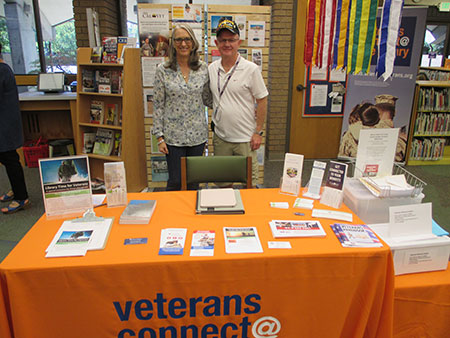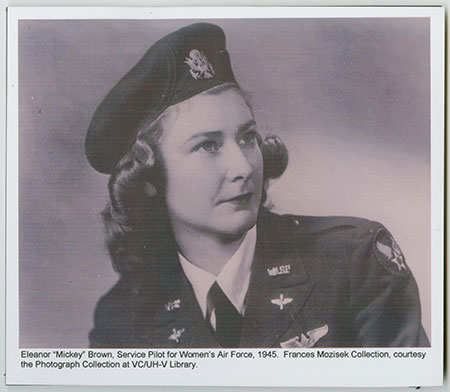Blog Posts | November 10, 2020
Share ThisLibraries, Museums, and Military Veterans: Telling Stories of Service
By Erica Jaros

While Veteran’s Day has its roots in the armistice of World War I, today’s military veterans are important members of the community. As we pause this November 11 to honor our country’s veterans, we also recognize their service by reaching out to serve them.
Museums and libraries are often thought of as institutions of learning, but they are also a hub for resources and programs to support, develop, and preserve the stories of our veterans. For some, separating from service can be difficult, but museums and libraries are working to help veterans and their families find the right resources to access benefits, transition to civilian life, find job opportunities, and overcome post-traumatic stress disorder.
Across the country, institutions are using IMLS funding to create and expand these services to help veterans, and better connect the military with the community.
-
The New York Botanical Garden used a Museums for America grant to create a new horticultural therapy intervention for veterans that is designed to reduce symptoms of social isolation and foster healthy and active lifestyles. A licensed horticultural therapist will facilitate a series of sessions, each consisting of four weeks of seasonally based activities that include planting, seed starting, watering, weeding, cooking, and nutrition education.
-
The Illinois Joining Forces Foundation partners received a National Leadership Grant for Libraries to identify the assets within the seven most veteran-populated regions in Illinois, and identify gaps in services to active duty service members, veterans, and their families. The partners plan to establish a veteran support community that is fully integrated into a statewide network of veteran service providers, libraries, archives, museums, and community veteran service organizations.
-
The University of Texas at Austin's School of Information and its partners received a Laura Bush 21st Century Librarian Program grant to help more U.S. veterans become librarians. The three-year project includes scholarships for 12 veterans to attend Library Information Services masters programs; and research exploring how military veterans choose careers in librarianship and information studies.
-
Pacific Library Partnership received LSTA funds from the California State Library and IMLS to develop “Veterans Connect @ the Library”, a multi-year project designed to connect veterans and their family members with federal and state benefits. Participating libraries provide benefits information, facilitate library-based Veteran Resource Centers, and hold programs to help women veterans obtain benefits and learn about employment resources.
Museums and libraries are also dedicated to preserving the military history of their local community. As the generations pass, it has become increasingly important to document the local stories of veterans from World War II through more recent conflicts.

-
The Chickaloon Native Village will use a Native American Museum Services grant to implement the Nay'dini'aa Na' Kayax Nahwgholnicde project to create a record of indigenous peoples' military contributions and the effects of war service on their lives. The project includes re-housing and digitizing materials that document the World War II military experience of a Chickaloon Native Village tribal citizen and recording oral history interviews with tribal citizens who are veterans.
-
The Huna Totem Corporation used a Native American Library Services grant to conduct a two-year “Honoring our History through Stories” project to gather 20 audio recordings of veterans sharing their stories; digitize photos contributed by veterans; and develop a film series from previously recorded, uncut videos of elder interviews.
-
Faculty from The School of Library & Information Science at Louisiana State University are using a Laura Bush 21st Century Librarian Program grant to research best practices and protocols to help archivists assist veterans and active duty personnel in preserving their personal digital archives. This Early Career development project will create best practice digital preservation protocols for assisting veterans with preserving their personal records.
With only about one percent of Americans volunteering to serve in uniform, developing programs that connect military history and veteran stories with the public has become a focus of some institutions.
-
The USS Constitution Museum used a Museums for America grant to launch a Salute to Service initiative to transform itself into a hub for conversation, connection, and community around military service. A strategic focus on service members, veterans, and their families will significantly strengthen and expand how the museum enhances the general public's understanding of the military community, their service, and family sacrifice.
-
The New-York Historical Society used a Museums for America grant to engage audiences around a major exhibition on the Vietnam War. The exhibition was accompanied by a series of public programs and discussions, educational curricula, workshops for students and teachers, and a multimedia resource website, laying the groundwork for a national dialogue on the legacy and lessons of the war.
For more information on IMLS and veterans, including the Community Salute program, visit imls.gov.
Erica, a Communications Specialist at IMLS, also currently serves as a staff sergeant in the District of Columbia Army National Guard.
